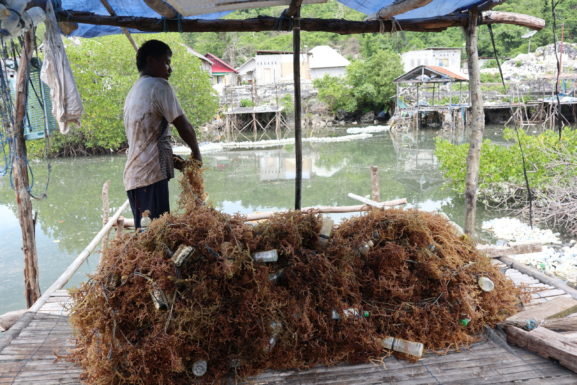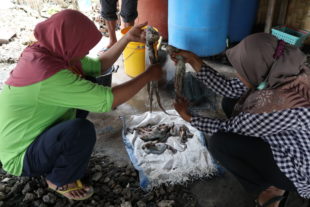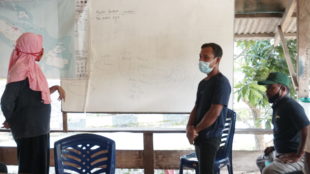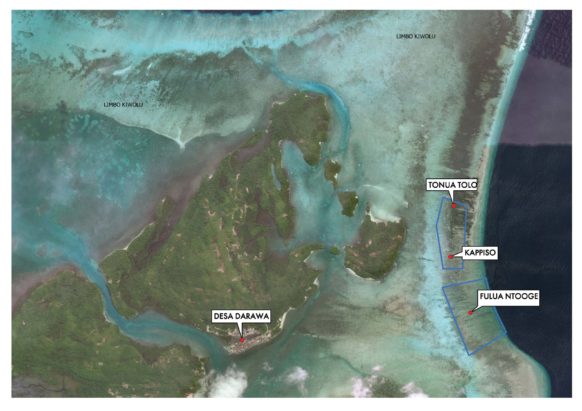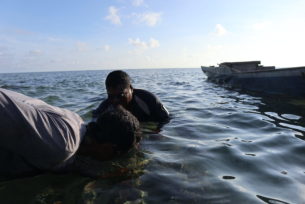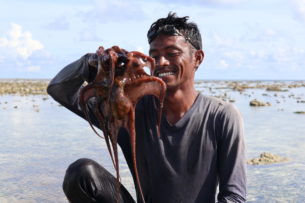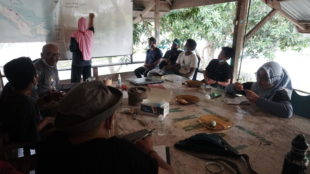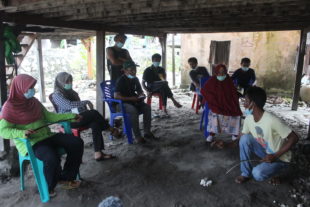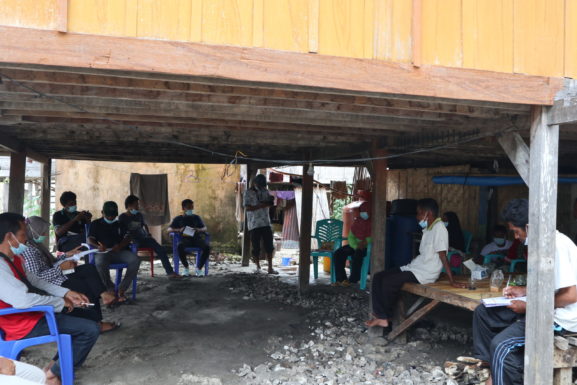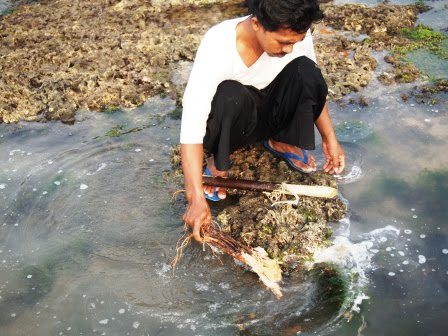
Caption: A fisher preparing tuba roots to catch fish | Credits: link
In the early 2000s, some fishers from Darawa island, located southwest of the Kaledupa sub-district of Wakatobi Regency in Indonesia, caught fish by destructive methods. The previously uninhabited island lacked plantations, and the fishers who moved there from the nearby larger island of Kaledupa had to rely on fishing for food. To ease the fishing process, they started using a natural fish poison made from the fruit and roots of the tuba tree, locally known as tofole, which grows abundantly on the island.
The tuba plant (Derris elliptica) is a member of the Leguminosae family and is native to southeast Asia and the southwest Pacific Islands. Fishers mainly use tuba root to catch fish that mostly live in crevices in and around coral reefs. These include the baronang fish (Siganus canaliculatus), the kola fish, moray eels known locally as suko or Kampa fish, and the snapper. Aside from the targeted fishes, tuba is not selective as it kills all the fishes in the fishing area.
So why fish using tuba?
The Darawa fishers had access to other fishing gear such as gillnets and traps. However, they still preferred to use tuba because it is readily available, economical, and more practical, reducing the time a fisher spends fishing. However, fish caught using tuba are sold cheaper than fish caught using nets and traps because buyers are worried about the side effects of eating poisoned fish, such as dizziness, nausea, and vomiting.
Raising awareness against the use of tuba.
Despite being an easy fishing method, the lack of knowledge and awareness on the health complications of eating such fish was high. The fishers did not also know that tuba also degraded other ecosystems. The lack of awareness led FORKANI (Forum Kahedupa Toudani), a community-based organisation (CBO) in Kaledupa, to start a fish assistance programme in 2006 to initiate change and reduce the use of tuba. The programme, supported by Yayasan Pesisir Lestari in partnership with Blue Ventures, uses monthly meetings and roadshows to raise awareness of the benefits of sustaining resources by avoiding destructive fishing practices.
In addition to raising awareness, FORKANI also works with communities to implement alternative income-generating activities such as seaweed farming. This initiative has been successful as fishers now earn more income from seaweed farming than tuba fishing. As more fishers turned their attention to seaweed for their income, they noticed that their seaweed harvest was poisoned by tuba, incentivising the community further to cut back on tuba. Due to the good income from seaweed farming, all Darawa fishers have since stopped using tuba. However, fishers from outside the community still use tuba in Darawa territory, posing a challenge. To stop this practice, FORKANI relies on the traditional institutions of Sara Barata Kahedupa. These institutions set the boundaries of customary fishing areas and impose sanctions for offenders through fines.
A sustainable solution
An octopus fishery management programme implemented in Darawa Village ensured the intervention on reducing harmful practices was sustainable. The process started with a series of community focus group discussions with leaders. The information collected included a register of octopus fishers in Darawa, the fishing locations, fishing gear, and dates of the octopus fishing seasons. Due to the presence of the traditional institution, which is respected and adhered to by the communities, FORKANI can support the strengthening and implementation of the programme by training community data collectors.
The community data collectors started to collect and assess data through a participatory process, something they have done since 2017. The findings informed the communities’ decision to close 50 hectares of the octopus fishing grounds at Fulua Nto’oge for three months and pass a no-fishing rule. Despite the closure, fishers still had access to 13 other fishing grounds. The temporarily closed area reduced destructive fishing activities in Fulua Nto’oge, which increased the number of octopus caught and improved water quality and seaweed production. Due to the success of the temporary closure, the Darawa community decided to replicate and increase the area of temporary closures. Additional temporary closures were set up in 2019 at the Uju Nu Umbu (50.64 hectares) and Kapiso Tonua Tolo (23.3 hectares), bringing the total closed area to 123.94 hectares.
Communities now understand the concept of community-based fisheries management, and the people of Darawa feel the benefits. Currently, the community is initiating data collection for other fish species and seaweed production. It is at the forefront of sharing their experiences on the customary-based fisheries management with communities in Maluku, other fishers, and the village government in Uwedikan Village Center in Sulawesi Province through an exchange programme. After five years (2016 to 2021), the Darawa community that used destructive fishing methods is now the coastal resource management leader.
By Made Dharma and Indah Rufiati


